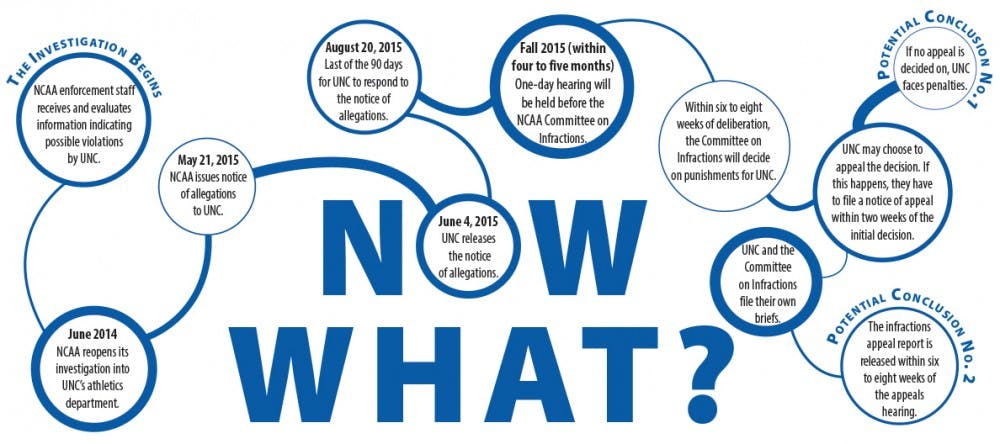The notice did not cite specific coaches or teams for violations, although men’s basketball coach Roy Williams, women’s basketball coach Sylvia Hatchell, former football coach Butch Davis and former athletic director Dick Baddour were interviewed for the investigation.
The Wainstein report revealed the paper classes were used most by football and men’s basketball players, but the notice also mentions women’s basketball and women’s soccer as offenders.
The inclusion of several emails between Boxill, a former academic adviser for women’s basketball, and other faculty have led some to believe that the program will receive the brunt of any punishments from the NCAA.
“The five allegations there are calling them out specifically,” said Dan Bruton, president of SportRx and a sports marketing professor at the University of San Diego. “So I think there is a big target on (Boxill) and the women’s program for sure.”
Hatchell defended her program and said University officials have learned from their mistakes.
“I’ve always run my program with integrity,” Hatchell said. “That’s why reading some of the allegations is so disappointing.”
Williams, who was only mentioned once in the notice of allegations, said in a statement that he was disappointed with the NCAA’s findings.
“Everyone who loves Carolina is truly saddened by these allegations,” Williams said. “We aspire to and work toward meeting higher standards than the actions that warranted this notice.”
Sanctions could come internally or externally
Since the University conducted an independent investigation, the results of which were released in the Wainstein report, some thought the University would self-impose sanctions.
“I think that ship has sailed,” Bruton said. “I think once you’re caught with your hand in the cookie jar that it’s a little bit late to say, ‘Hey, we are going to take care of this now.’”
Lewis Margolis, associate professor of maternal and child health at UNC, said he believes the University should vacate wins.
To get the day's news and headlines in your inbox each morning, sign up for our email newsletters.
“And we are only talking about games here, you know. Nobody died. Nobody suffered long-term injuries,” Margolis said. “I think the University should forfeit these games, and that would be an acknowledgement — one acknowledgement that we did not do right, that we violated the rules.”
Sending a message
In a conference call with the media on the day the notice was released, Director of Athletics Bubba Cunningham said he agreed with some of the allegations but took issue with others. He said he is concerned about the effect the investigations and public scrutiny have had on the program and the University.
“It has been a difficult environment on the campus for us as staff members, as athletic department staff members, as faculty, as students, and I do think the length of time has impacted our ability to attract some of the students that would have committed to the institution in previous years,” Cunningham said.
Michael Buckner, an attorney specializing in sports law, said while UNC’s situation is unprecedented, he compares it to the case of academic fraud at the University of Southern California.
“USC was just a few student-athletes, but at UNC we’re talking more student-athletes, more administrators over a longer period of time,” Buckner said. “The NCAA is going to use UNC’s case to send a message about the seriousness of these violations.”
Like USC, UNC will be tried under the old NCAA penalty structure, which was revised in 2013. Buckner said possible penalties could include vacated wins, forfeited championships, lost scholarships and postseason bans.
“You just look back at Penn State or USC. You’ve got student athletes there now that have nothing to do with this, and they’re the ones that are going to suffer the consequences,” Bruton said. “I mean Reggie Bush is playing for the Detroit Lions or whoever he’s playing for, and the NCAA is hammering USC, and Pete Carroll is winning a Super Bowl, and none of them are there anymore. And the poor guys who were seniors in high school said, ‘Hey, I want to go to USC.’ And now they’re sophomores and juniors, and they are the ones suffering for it.”
Moving forward
UNC must respond by August 20. The NCAA’s enforcement staff will then have 60 days to conduct a pre-hearing conference. In four to five months, University officials will go before the NCAA Committee on Infractions at a one-day hearing.
Within six to eight weeks of the hearing, the Committee on Infractions will release penalties in a Public Infractions Report.
UNC may appeal the sanctions within two weeks of the decision. After an appeal, there will be another hearing and a final decision six to eight weeks after that.
“If you think of all the resources that go in now to the response, yet another major report, so all the resources that go into the response for this — imagine how those resources could be used in other ways to make the University stronger and better ... it’s a sad additional cost of participating in the big-time sports enterprise,” Margolis said.
university@dailytarheel.com
Clarification: A previous version of this story had a sub-headline that mischaracterized the University's options for sanctions. The University can still self-impose sanctions. The story has been updated to reflect this change.




